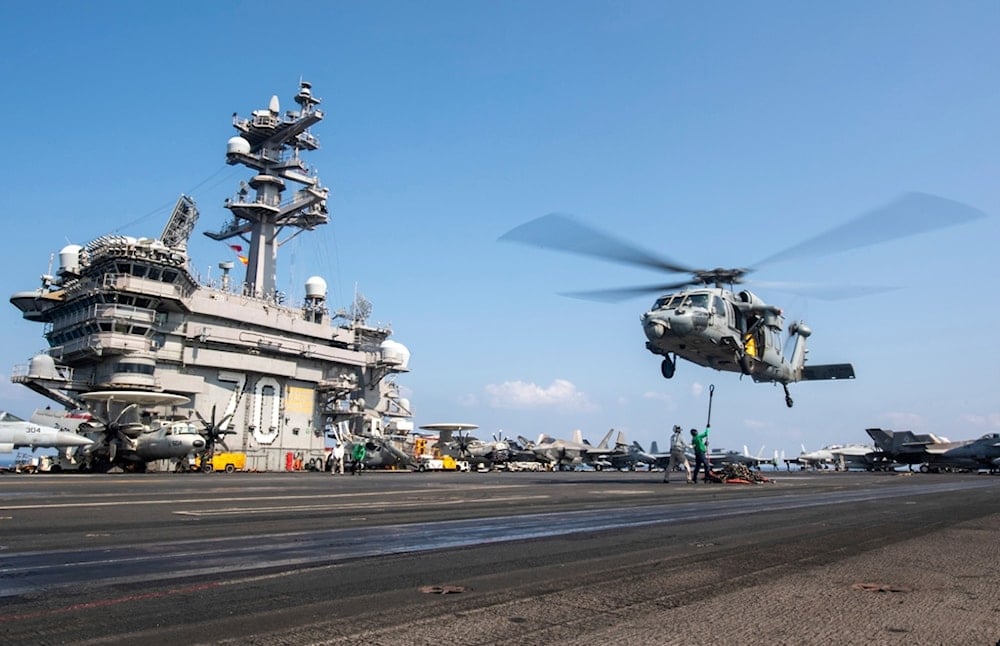Trump's Iran strike revives fears of US military failures: CNN
US failures in Iraq, Syria, and Afghanistan cast doubt on Trump's strike strategy against Iran, raising fears of another prolonged regional disaster.
-

This photograph released by the US Navy shows an MH-60S Sea Hawk helicopter hovering over the USS Carl Vinson aircraft carrier while operating in the Middle East, April 12, 2025. (AP)
The United States has "a long and troubled record of military intervention in the region", marked more by failure than by strategic success, CNN said in an analysis piece on Sunday. It stressed that it failed to topple the Syrian government, despite years of attempts, and merely watched last year as sweeping political shifts ousted one of Iran’s main regional allies.
CNN also commented on the US's longest war, that on Afghanistan, which it stressed ended in a humiliating defeat. As for Iraq, the report said the war there began with contested claims over weapons of mass destruction and concluded in disaster, leaving behind years of destruction and human loss.
Iran, however, is not Iraq, CNN said, adding that last night was not March 20, 2003, the day the ill-fated US invasion of Iraq began. Still, the US's dubious track record and the overconfident atmosphere surrounding President Donald Trump’s excessive use of force have only heightened regional concerns about what comes next, the report added.
Did the US terminate Iran's nuclear program?
The report revolved around one key question, which is whether the US airstrikes were successful in terminating Iran's nuclear program or the damage they might have inflicted upon it, as Tehran maintains that it had moved all enriched uranium out of the targeted facilities to undisclosed locations.
The report also wondered about how Iran could respond, saying it may resort to an asymmetrical response and target the US through cyber operations or disruptions of the Strait of Hormuz. However, it stressed that Iran was not under the pressure of electoral cycles.
Unlike the US, which has repeatedly stumbled across the region with rushed and often failed military campaigns, from Iraq and Syria to Afghanistan, Iran’s strategy is shaped by endurance. This long-term vision may allow it to bide its time until regional tensions settle before making its next move.
'Assassination of international law'
Iranian Foreign Minister Abbas Araghchi issued a stern response to the American attack on Iran earlier in the day. He warned that Iran possesses a broad array of options for retaliation and would deploy all its capacities to defend its people and territory.
“We will not announce what actions we intend to take in response to this aggression,” Araghchi stated, labeling the strike as “a flagrant assassination of international law and a direct threat to global peace and security.”
In response to the escalating crisis, International Atomic Energy Agency (IAEA) Director General Rafael Grossi announced an emergency session of the agency’s Board of Governors scheduled for Monday in Vienna.
“In light of the urgent situation in Iran, I am convening an emergency meeting of the @IAEAorg Board of Governors for tomorrow,” Grossi posted on X on Sunday.
Separately, the head of Iran’s Atomic Energy Organization sent a formal letter to the IAEA, demanding an independent investigation into the US aggression. Iranian officials have insisted that the targeted facilities were operating under full IAEA supervision and posed no nuclear threat.
Read more: Araghchi: US committed serious violation; Iran will defend sovereignty

 3 Min Read
3 Min Read










